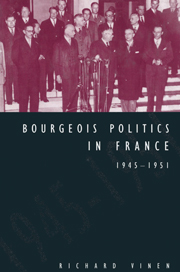Book contents
- Frontmatter
- Contents
- Preface
- List of abbreviations and French political groups
- 1 Introduction
- 2 A historiographic overview
- 3 International comparisons
- 4 Notables
- 5 Bourgeois parties and the female electorate
- 6 Organized business and politics
- 7 Administration
- 8 Opposition nationale
- 9 The Parti Républicain de la Liberté
- 10 Machine à ramasser les Pétainistes? The Mouvement Républicain Populaire and the conservative electorate
- 11 The Rassemblement des Gauches Républicaines
- 12 The Rassemblement du Peuple Français
- 13 Independents and Peasants
- 14 The Groupement de Défense des Contribuables
- 15 Conclusion
- Appendix. The electoral law of 1951 and apparentements
- Bibliography
- Index
2 - A historiographic overview
Published online by Cambridge University Press: 06 July 2010
- Frontmatter
- Contents
- Preface
- List of abbreviations and French political groups
- 1 Introduction
- 2 A historiographic overview
- 3 International comparisons
- 4 Notables
- 5 Bourgeois parties and the female electorate
- 6 Organized business and politics
- 7 Administration
- 8 Opposition nationale
- 9 The Parti Républicain de la Liberté
- 10 Machine à ramasser les Pétainistes? The Mouvement Républicain Populaire and the conservative electorate
- 11 The Rassemblement des Gauches Républicaines
- 12 The Rassemblement du Peuple Français
- 13 Independents and Peasants
- 14 The Groupement de Défense des Contribuables
- 15 Conclusion
- Appendix. The electoral law of 1951 and apparentements
- Bibliography
- Index
Summary
The historiography of the Fourth Republic has a curiously backward feel. Many of the best works on the subject were written almost contemporaneously. Two institutions helped to raise the standard of political analysis to new levels. The first of these was a new newspaper, le Monde, which allowed its journalists to digress at great length on their particular interests. Many of those who wrote for le Monde, such as Jean Planchais, Jean Lacouture and Jacques Fauvet, were later to become recognized authorities on their subject. The second institution was the Fondation Nationale des Sciences Politiques which launched two new publications during the period: the Cahiers de la Fondation Nationale des Sciences Politiques and the Revue Française de Science Politique. Political science was a prestigious discipline in post-war France which attracted a succession of brilliant students such as Stanley Hoffmann, Jean Touchard and Georges Vedel. The subject was stimulated by new approaches and ideas that were coming from the other side of the Atlantic and by a mass of empirical data that was made available by the beginning of large-scale opinion polling in France. Political scientists accumulated information on subjects ranging from the consumption of toiletries among the Parisian bourgeois to the statistical correlation between possession of motor cars and divorce rates.
Work on Fourth Republic France was also produced by scholars from overseas. Some of this work was journalistic and superficial, and most of it suffered from the absence of good sources.
- Type
- Chapter
- Information
- Bourgeois Politics in France, 1945–1951 , pp. 12 - 20Publisher: Cambridge University PressPrint publication year: 1995

